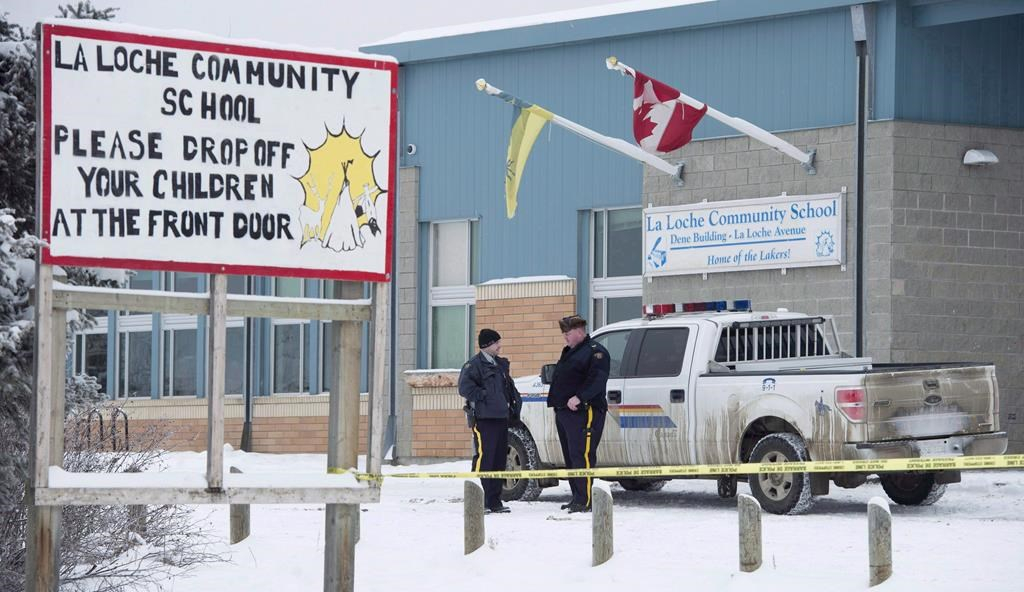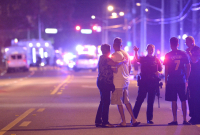Support strong Canadian climate journalism for 2025
A Saskatchewan judge is weighing whether a teenager who fatally shot four people and injured seven others at a school and a home in La Loche, Sask., should be sentenced as an adult or a youth.
His sentencing hearing wrapped up Friday; now it's up to Judge Janet McIvor to consider all the testimony and evidence that has been presented since the hearing started in May. Her decision is expected Feb. 23.
The prosecution argued the teen should be sentenced as an adult after pleading guilty to two counts of first-degree murder, two counts of second-degree murder and seven counts of attempted murder for the attack in January 2016.
Crown prosecutor Pouria Tabrizi-Reardigan noted the teen researched school shootings and guns online. He also researched what it felt like to kill someone.
"(The teen's) school shooting was not this sudden, impulsive outburst ... rather the shooting had historical awareness and depth," Tabrizi-Reardigan told the court in Meadow Lake, Sask. "In our case, it seems that (the teen) knew exactly why he committed the offences."
He said the teen ultimately knew he was outgunned by police and gave himself up at the school — a sign he knew the consequences of his actions. The teen may have panicked but carried out his plan "with stark efficiency."
Tabrizi-Reardigan also argued that the teen has never expressed genuine remorse about the plan to shoot up the school.
The young man cannot be named because he was just shy of his 18th birthday when the shootings occurred.
The defence lawyer is seeking a youth sentence.
"The point being that simply because it's a serious offence doesn't obligate the court to sentence the person as an adult," said Aaron Fox, adding the teen suffers from fetal alcohol syndrome and has cognitive problems which have affected his maturity.
The teen also doesn't have a criminal record, he noted.
"This was not a person who had a history of violence," Fox told court.
The teen has said he wasn't bullied, but Fox said the youth hated school and was repeating Grade 10 for the third time.
In June, a neuropsychologist testified for the defence that the teen had an IQ of 68, which is considered well below average.
However, a child psychiatrist who testified for the Crown has already said the teen did not come across as being overtly developmentally delayed or slow.
The penalty if he is sentenced as a youth could be six years of custody and four years supervision; as an adult, he could face a life sentence, but would get credit for time already spent in custody, meaning he could be eligible for parole after 10 years.
Some victims have already told court that the teen should be sentenced as an adult because of the severity of his crimes.
An agreed statement of facts detailed the shooter's murderous path from the home in La Loche to the community's high school.
The teen first killed Dayne Fontaine, 17, and then his brother Drayden, who was 13. Dayne pleaded for his life before he was shot 11 times, including twice in the head. Drayden was shot twice.
The teen then drove to the high school, where surveillance footage captured his frightening walk through the halls, his shotgun raised, as students and staff ran in fear.
When police arrived, the shooter ran into a women's washroom where he put his weapon down and gave himself up.
The teen said he didn't know what he was thinking when he pulled the trigger.
Fox said his client has never blamed anyone else for his actions and did express remorse and apologize to his victims.
McIvor said she'll deliver the sentence in La Loche.
Mayor Robert St. Pierre said that could bring some closure to the community, but he does have some concerns.
"It's just two years and a month after the incident and it's back in La Loche, so the winter scenery, it's going to dredge up a lot of memories," St. Pierre told reporters outside the courthouse.





Comments